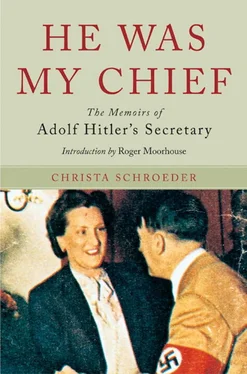Christa Schroeder - He Was My Chief - The Memoirs of Adolf Hitler's Secretary
Здесь есть возможность читать онлайн «Christa Schroeder - He Was My Chief - The Memoirs of Adolf Hitler's Secretary» весь текст электронной книги совершенно бесплатно (целиком полную версию без сокращений). В некоторых случаях можно слушать аудио, скачать через торрент в формате fb2 и присутствует краткое содержание. Город: Barnsley, Год выпуска: 2012, ISBN: 2012, Издательство: Frontline Books, Жанр: История, Биографии и Мемуары, на английском языке. Описание произведения, (предисловие) а так же отзывы посетителей доступны на портале библиотеки ЛибКат.
- Название:He Was My Chief: The Memoirs of Adolf Hitler's Secretary
- Автор:
- Издательство:Frontline Books
- Жанр:
- Год:2012
- Город:Barnsley
- ISBN:978-1-7830-3064-4
- Рейтинг книги:4 / 5. Голосов: 1
-
Избранное:Добавить в избранное
- Отзывы:
-
Ваша оценка:
- 80
- 1
- 2
- 3
- 4
- 5
He Was My Chief: The Memoirs of Adolf Hitler's Secretary: краткое содержание, описание и аннотация
Предлагаем к чтению аннотацию, описание, краткое содержание или предисловие (зависит от того, что написал сам автор книги «He Was My Chief: The Memoirs of Adolf Hitler's Secretary»). Если вы не нашли необходимую информацию о книге — напишите в комментариях, мы постараемся отыскать её.
He Was My Chief: The Memoirs of Adolf Hitler's Secretary — читать онлайн бесплатно полную книгу (весь текст) целиком
Ниже представлен текст книги, разбитый по страницам. Система сохранения места последней прочитанной страницы, позволяет с удобством читать онлайн бесплатно книгу «He Was My Chief: The Memoirs of Adolf Hitler's Secretary», без необходимости каждый раз заново искать на чём Вы остановились. Поставьте закладку, и сможете в любой момент перейти на страницу, на которой закончили чтение.
Интервал:
Закладка:
That evening during the bombing raid just before 2200 Johanna and I were summoned by Hitler. He received us in his room looking tired, pale and listless. The situation over the last four days had changed considerably, he told us. On 16 April at lunch in the Staircase Room when I asked him whether we would remain in Berlin he had replied almost involuntarily: ‘Of course we shall remain in Berlin. You need have no fear!’ I told him that I had no fears since I had come to terms with dying. However I could not imagine how Germany could carry on when our forces were being sandwiched ever more firmly between the Americans and the Russians. ‘Remain calm’, he went on in annoyance, ‘Berlin will remain German, we just have to gain time!’ Even in his last address to the Gauleiters on 24 February 1945 in Berlin he had informed them of his unshakeable conviction that ‘we must gain time!’
Now the tune had changed. ‘Over the last four days the situation has changed to such an extent that I find myself forced to disperse my staff. As you are the longest serving, you will go first. In an hour a car leaves for Munich. You may take two trunks, Reichsleiter Bormann will give you further instructions.’ Since I had no family I requested permission to stay in Berlin. This would allow my junior colleague to leave instead. Her mother lived in Munich. He would not accept this.
No, later I will found a resistance movement, [132] Schroeder confirmed that Hitler said this. What it meant remains a mystery.
and for that I need you both. You are the most valuable people to me. If it comes to the worst, the young will always come through. Frau Christian (Dara) will in any case get away and if another of the younger girls fails to make it, that is Fate!
He did not take his leave of us as he usually did with a kiss to the hand, but gave us a handshake instead, probably his way of indicating that he would hear no further appeals and that the matter was closed. He must have noted our subdued mood for he added, perhaps in an attempt to comfort us: ‘We shall meet again, I am coming down in a few days!’ This order to abandon Berlin on 20 April 1945 was not what I had expected for myself, since I had already decided to use the cyanide capsule which Skorzeny had sold me for a bottle of whisky. Trevor Roper, the British historian, pretended to know my movements better than I did, for in the German language version of his book, Hitlers Letzte Tage [133] 3rd edition, Ullstein, 1965.
he wrote: ‘Two of Hitler’s secretaries, Fräulein Wolf and Fräulein Schroeder… fled on 22 April…’
I had always abhorred sudden and unexpected enforced journeys. This latest order by Hitler awoke in me far greater feelings of reluctance than ever before, and left me in a state of confusion. As if stunned I departed Hitler’s room to begin packing along with my colleague Wolf. None of my possessions was in storage. I had left several trunks in the west and east in 1944, and had them forwarded to me in Berlin at the beginning of 1945 before the Allied advance, on the basis of Hitler’s assurance that my things would be safest there.
On the way to the Voss-Strasse bunker, where we secretaries had a room for sleeping and storage, I saw armaments minister Speer in the telephone exchange. I told him of Hitler’s order and asked him then about Dr Brandt, whose fate concerned me greatly. Hitler had sentenced him to death for defeatism and he was being held prisoner in a Berlin villa. Speer told me: ‘We will spring him!’
The vestibule of the Voss-Strasse bunker was crowded with civilians from Voss-Strasse sheltering from the air raid. The room allocated to us was originally built as a transmitter room. I was very unhappy about the room, for the ceiling and walls were soundproofed and suppressed the tones of conversation. It was a dead room, oppressively quiet like a tomb.
The packing seemed senseless. Suddenly the telephone rang. It was Hitler. In a weak voice he said: ‘Children, the hole is closed up (we were to have driven through the Czech Protectorate). The car cannot go through and you will have to fly early tomorrow.’ He rang again after midnight: ‘Children, make ready, hurry, the machine will take off as soon as it is warmed up.’ His voice sounded flat, and he broke off halfway through the conversation. I called out, but although he had not hung up he made no reply. These were the only telephone calls from him I ever received in my twelve years of service…
A short while later, around 0230, we struggled through the crowded corridors of the Reich Chancellery bunker on Voss-Strasse. It sounded like a beehive. Everybody stared at us and our two cases with curiosity. I felt strange and passed the anxious bystanders full of shame. In the courtyard of the Radziwill Palace a lorry stood ready. Johanna Wolf and I handed over our cases. Johanna had an unpleasant feeling about her luggage and after it had been stowed she had second thoughts about parting with it. I had not fully realised the chaotic situation, and I told her there would be no problem. As it later transpired, we went to Tempelhof airport and our luggage to Staaken.
In the courtyard of the Radziwill Palace chaos reigned. All vestiges of order for the departures had vanished. Unknown drivers from the SS-Leibstandarte waited with their vehicles for their scheduled passengers. As no light could be shown, it was very difficult to find one’s way around. When we finally located our vehicle, its driver did not know Berlin, and he had no orders to take us to Tempelhof or Staaken. Eventually he got us to Tempelhof, how he managed to get round the red tape I have no idea. It was a macabre drive through the night past burning houses, smouldering heaps of rubble, ruins and smoke, and Volkssturm men hastily erecting street barricades. In the middle distance we could hear the thunder of Soviet artillery.
At Tempelhof airport nobody had knowledge of the Ju 52 of which Hitler’s Luftwaffe adjutant Oberst von Below had spoken. The airport commander advised us to try to board a Junkers transport bound for Salzburg whose arrival had just been notified from northern Germany. After some negotiations we succeeded in this. Without luggage, only a travel bag and knapsack, packed at the last minute on Schaub’s orders and which contained round tins of ‘Shoko-Dallmann’, [134] ‘Shoko-Dallmann’ were vitamin tablets with caffeine covered in chocolate and marketed in round tins.
the aircraft took off in rain and snow. After an exciting flight over burning villages and towns we touched down at Salzburg in the early morning. One can imagine our fright when through the cotton-wool ear plugs we heard sounds similar to shooting and the machine seemed to lose height quickly. We sat speechless in the aircraft between soldiers seated on green ammunition cases. I do not remember a single word being spoken. We were as if paralysed as we landed. The silence was suddenly oppressive.
While on the bus for Obersalzberg a few hours later I reflected on how lucky we were to have come out of this flight alive. It was actually a double miracle that we had survived. The Ju 52 [135] Actually a Ju 352 of the Führer-Staffel , piloted by Major Friedrich Gundelfinger.
which took off from Staaken, and on which we were booked, crashed at Börnersdorf near Dresden. One of the two female bodies burnt to a crisp was identified as me because my trunk was stored in the cargo hold. The victims were interred by the Wehrmacht. I did not learn of this until several years later. The crew had allocated our two unclaimed seats to two other women, and it was their remains which were wrongly identified after the crash. German soldiers in the Börnersdorf vicarage removed some of the items from my trunk, and left the remainder for the Soviets. This was at any rate what I was told by the priest, who was unable to reveal any details at all about my alleged burial and said I should contact the authorities in East Berlin. The identity of the woman who took my place aboard the aircraft and was buried under my name was researched for many years but remained a mystery. [136] Hitler’s favourite manservant Wilhelm Arndt was one of the passengers aboard this flight. The official list of the dead was: Major Gundelfinger, pilot; Basler, radio operator; Arndt; Budka; Becker; Fiebers; Schleef; an unknown male and two women; E. Krüger and Christine Schroeder. ‘The two women were carbonised and identified from their clothing.’ The unknown male may have been a member of the SS-Begleitkommando who ‘left on a flight to Upper Bavaria with a manservant and two secretaries…’ Else Krüger was not the other woman identified. She was Martin Bormann’s secretary and remained at the Reich Chancellery until her escape from Berlin on 1 May 1945.
Интервал:
Закладка:
Похожие книги на «He Was My Chief: The Memoirs of Adolf Hitler's Secretary»
Представляем Вашему вниманию похожие книги на «He Was My Chief: The Memoirs of Adolf Hitler's Secretary» списком для выбора. Мы отобрали схожую по названию и смыслу литературу в надежде предоставить читателям больше вариантов отыскать новые, интересные, ещё непрочитанные произведения.
Обсуждение, отзывы о книге «He Was My Chief: The Memoirs of Adolf Hitler's Secretary» и просто собственные мнения читателей. Оставьте ваши комментарии, напишите, что Вы думаете о произведении, его смысле или главных героях. Укажите что конкретно понравилось, а что нет, и почему Вы так считаете.












